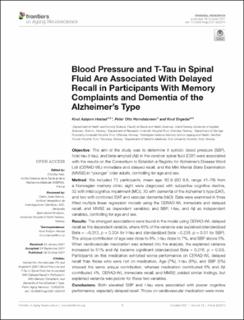| dc.description.abstract | Objective: The aim of the study was to determine if systolic blood pressure (SBP), total-tau (t-tau), and beta-amyloid (Aβ) in the cerebral spinal fluid (CSF) were associated with the results on the Consortium to Establish a Registry for Alzheimer’s Disease Word List (CERAD-WL) immediate and delayed recall, and the Mini Mental State Examination (MMSE) in “younger” older adults, controlling for age and sex. Method: We included 72 participants, mean age: 62.9 (SD 8.6, range 41–76) from a Norwegian memory clinic; eight were diagnosed with subjective cognitive decline, 32 with mild cognitive impairment (MCI), 30 with dementia of the Alzheimer’s type (DAT), and two with combined DAT and vascular dementia (VaD). Data were examined in three fitted multiple linear regression models using the CERAD-WL immediate and delayed recall, and MMSE as dependent variables; and SBP, t-tau, and Aβ as independent variables, controlling for age and sex. Results: The strongest associations were found in the model using CERAD-WL delayed recall as the dependent variable, where 45% of the variance was explained (standardized Beta = −0.313, p = 0.004 for t-tau and standardized Beta −0.238, p = 0.01 for SBP). The unique contribution of age was close to 8%, t-tau close to 7%, and SBP above 5%. When cardiovascular medication was entered into the analysis, the explained variance increased to 51% and Aβ became significant (standardized Beta = 0.216, p = 0.03). Participants on this medication exhibited worse performance on CERAD-WL delayed recall than those who were not on medication. Age (7%), t-tau (6%), and SBP (5%) showed the same unique contribution, whereas medication contributed 6% and Aβ contributed 4%. CERAD-WL immediate recall, and MMSE yielded similar findings, but explained variance was poorer for these two variables. Conclusions: Both elevated SBP and t-tau were associated with poorer cognitive performance, especially delayed recall. Those on cardiovascular medication were more impaired than were participants who were not on this medication—a finding that probably reflected cerebral incidents in the medicated group. | |

